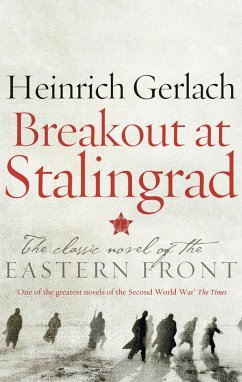'One of the greatest novels of the Second World War' The Times
'A remarkable find' Antony Beevor
'A masterpiece' Mail on Sunday
Stalingrad, November 1942.
Lieutenant Breuer dreams of returning home for Christmas. But he and his fellow German soldiers will spend winter in a frozen hell - as snow, ice and relentless Soviet assaults reduce the once-mighty Sixth Army to a diseased and starving rabble. Breakout at Stalingrad is a stark and terrifying portrait of the horrors of war, and a profoundly humane depiction of comradeship in adversity.
The book itself has an extraordinary story behind it. Its author fought at Stalingrad and was imprisoned by the Soviets. In captivity, he wrote a novel based on his experiences, which the Soviets confiscated before releasing him. Gerlach resorted to hypnosis to remember his narrative, and in 1957 it was published as The Forsaken Army. Fifty-five years later Carsten Gansel, an academic, came across the original manuscript of Gerlach's novel in a Moscow archive. This first translation into English of Breakout at Stalingrad includes the story of Gansel's sensational discovery.
'A remarkable find' Antony Beevor
'A masterpiece' Mail on Sunday
Stalingrad, November 1942.
Lieutenant Breuer dreams of returning home for Christmas. But he and his fellow German soldiers will spend winter in a frozen hell - as snow, ice and relentless Soviet assaults reduce the once-mighty Sixth Army to a diseased and starving rabble. Breakout at Stalingrad is a stark and terrifying portrait of the horrors of war, and a profoundly humane depiction of comradeship in adversity.
The book itself has an extraordinary story behind it. Its author fought at Stalingrad and was imprisoned by the Soviets. In captivity, he wrote a novel based on his experiences, which the Soviets confiscated before releasing him. Gerlach resorted to hypnosis to remember his narrative, and in 1957 it was published as The Forsaken Army. Fifty-five years later Carsten Gansel, an academic, came across the original manuscript of Gerlach's novel in a Moscow archive. This first translation into English of Breakout at Stalingrad includes the story of Gansel's sensational discovery.

